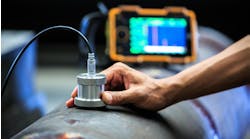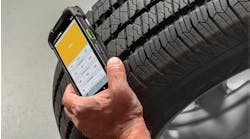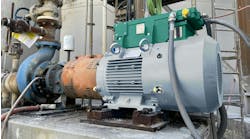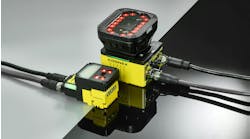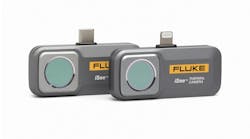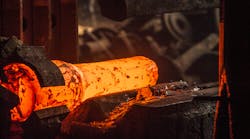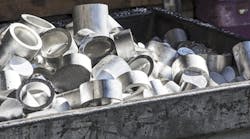Recent
The Benefits of Forged Aluminum Components for Electric Vehicles
In the decades just ahead of us, electric vehicles will overtake the automotive industry. Already, California has ordered that by 2035 all new passenger vehicles sold in the state must be all-electric. The recently unveiled American Jobs Plan proposes $174 billion of incentives, rebates, and investments to push the production and adoption of electric vehicles. Also, General Motors has proposed an end to the production of all diesel and gasoline-powered cars by 2035 and a shift of its entire fleet to electric vehicles.
These are just a few recent headlines as the world looks forward to—and automakers make plans for—a greener, more electric future.
Internal Combustion Engines vs. EVs
With this shift to electric vehicles, the forging industry has seen both negative and positive projections. The production of electric vehicles, and the designs for their parts, is significantly different from what is involved in producing petroleum-powered vehicles. Internal combustion engine vehicles have a few design limitations due to their method of power generation, which requires more internal components.
Heat and Cooling
Internal combustion engines (ICEs) generate a tremendous amount of heat, while electric vehicles produce relatively little in comparison. This heat needs to be dissipated quickly to avoid overheating, requiring various manifolds, tubes, hoses, assemblies, and shafts to efficiently and rapidly direct coolant in and around the engine.
Meanwhile, the cooling systems on electric vehicles are simpler and require fewer components to direct coolant efficiently.
Constant RPMs
A standard engine requires a certain frequency of combustion, known as the “Power Band,” within the engine to keep the motor running. As such, the vehicle requires complex gearboxes to maintain a certain range of RPMs while allowing the wheels to turn at any desired speed. Electric motors can turn at incredibly high rpms (upwards of 10,000 rpm) but do not have a traditional power band. This means that electric motors require only a single-gear “reducer” instead of a standard multi-gear transmission.
Fluids
The internal-combustion process has a lot of fast-moving internal parts that, without proper lubrication, can fail very prematurely and completely wreck an engine. Electric vehicles do not require engine oil and often do not include power steering fluid due to all-electric power steering. This reduced need for various fluids requires fewer tanks, hoses, and tubes to direct the fluid around the vehicle chassis.
Electrical Generation
Because even an internal-combustion engine requires electrical power for running various peripherals (lights, radio, air conditioning, etc.) and the main computer and sensors, it must have a complicated power generation system in addition to the car battery. An electric vehicle requires fewer overall components dedicated to reclaiming some power from braking. The rest of the power comes from the EV battery; the same source used to drive the car.
With all of these considerations and others too, electric vehicles require significantly fewer internal metal components. Many have speculated that this may negatively affect the forging industry. However, it’s important to understand that, despite the simplicity of EVs, forged components will only become more valuable to automotive manufacturers.
Forged Aluminum Parts’ Performance
Automotive designers and manufacturers are always looking for the best tradeoff between price and performance. In an internal combustion vehicle, the large number of internal metal components makes this a much more delicate balancing act. A slight increase in the price of each component can lead to a significant impact on the final manufacturing price of the vehicle.
But the simplicity of electric vehicle designs makes a fully forged aluminum vehicle a much more attractive option.
Forged aluminum components bring several benefits, owing to the nature of their structure and production that make them superior to castings, including:
- Strength: Forging metal components involves a process called “plastic deformation,” whereby the internal structure of a solid block of metal is permanently altered into a new shape. This new shape will carry with it internal stresses, as the components’ sub-structure is not properly aligned. This contributes to an overall level of strength and rigidity that no casting can achieve.
- Reliability: Due to the plastic deformation of a forged component, its reliability is greater than a machined or cast component. The rigidity of a forged component means that it does not deform significantly over time, thus making it more reliable for applications in which that type of wear is unacceptable.
- Weight: Due to the higher relative strength of a forged component and the strength-to-weight ratios of aluminum, a forged aluminum component can be made with smaller volumes of material overall, and in stronger geometries that reduce the weight of the final component. This can have compounding effects on the final weight of an assembled vehicle, without sacrificing performance.
Why is Forged Aluminum Right for EVs?
The benefits of forged aluminum components are apparent, but what makes them so well-suited for the emerging EV manufacturing industry? Here are just a few factors that make forged aluminum parts the right choice for electric vehicles.
Design Simplicity
Owing to the reduced need for many moving parts and the entire absence of certain subsystems in an electric vehicle, the design of electric vehicle mechanical components will be inherently simpler. Forged aluminum components allow designers to combine simple geometries for a more significant impact, which is important, as many engineering resources are currently dedicated to battery pack designs.
High Performance
As noted, pound-for-pound, forged aluminum components simply perform better than cast or machined automotive parts. For luxury or consumer vehicles, better performance and higher reliability lead to consumer loyalty and better sales.
The coming shift to electric vehicles may represent a reorganization for vehicle manufacturers, and those vehicles that deliver better performance and better reliability will be poised to capture an outsized share of the consumer base.
Production Speed
Electric vehicle manufacturers will benefit from a revolution in car sales coming soon. Those that are poised to provide the most products can garner the most sales volumes, and Amazon has shown that supply-chain management is critical to retailing success. As such, fast supplies of all EV components and faster factory turnarounds are vital to meeting production standards and getting the products into the market.
For a full ICE vehicle, the number of mechanical components may make forging seem like a slow process; but for an electric vehicle, with fewer parts to source, forge shops can easily produce all the necessary components at the same speed (or faster) than comparable casting shops.
Minimal Cost Impact
The initial cost of forged components may seem higher, but the overall benefits of using forged aluminum components for electric vehicles are rapidly bringing the price to near parity with other popular component manufacturing methods.
All of the points listed above minimize the cost impact of using forged components, allowing auto manufacturers to benefit from forged aluminum components without paying hefty costs.
Kerry Kubatzke is the lead sales manager for Anchor Harvey, an aluminum forger, and has over 35 years of experience in engineering and precision forge manufacturing. You can contact him by emailing [email protected].
